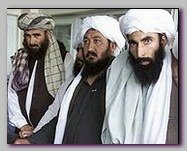– AFGHAN RECONCILIATION
 Afghanistan President Hamid Karzai argued, time and again, that there is no long lasting solution to Afghanistan unless Taliban is part of the solution (see – Karzais offer). He is not the only head of state in Central Asia thinking the same way. Pakistan’s leaders, despite enormous pressure from USA, are reaching out to Taliban, time and again, and while confronting the Taliban militarily, they also negotiate with the Taliban and make agreements with local Taliban warlords (see – Swat Truce II ).
Afghanistan President Hamid Karzai argued, time and again, that there is no long lasting solution to Afghanistan unless Taliban is part of the solution (see – Karzais offer). He is not the only head of state in Central Asia thinking the same way. Pakistan’s leaders, despite enormous pressure from USA, are reaching out to Taliban, time and again, and while confronting the Taliban militarily, they also negotiate with the Taliban and make agreements with local Taliban warlords (see – Swat Truce II ).
Taliban and the like are, indeed, political Islamic movements, but at the same time also an alliance of Pashtu tribes and the most authentic representatives of the Pashtu people scattered in North West (NWFP) Pakistan and South East Afghanistan. War against the Taliban is very much a war against the Pashtu people.
Today (03/2009) Taliban and Islamic militancy are posing a Mortal-threat to the state of Pakistan. More than seven years after USA-led forces ousted the Taliban regime in Afghanistan in operation Absolute Justice, shortly after The 9/11, the militants have regrouped and are waging an intensifying insurgency.
Indeed USA President Barack Obama‘s envoy to Afghanistan, Richard Holbrooke, has said, on Sunday 02/08/2009, in a conference in Munich, Germany, that winning the conflict there will be “much tougher” than in Iraq.
President Obama has suggested there could be talks with “moderate elements” of the Taliban in Afghanistan as part of a process of reconciliation. Mr Obama told the New York Times on board Air Force One, on Sunday 08/03/2009, that USA forces in Iraq had persuaded some Islamic radicals alienated by the tactics of Al Qaeda to co-operate (probably referring to the Awakening Councils in Iraq). He said there might be similar opportunities in Afghanistan, although the situation there was more complex.
“You have a less governed region, a history of fierce independence among tribes…those tribes are multiple and sometimes operate at cross purposes, and so figuring all that out is going to be much more of a challenge…I think we still have to think about how do we deal with that kind of scenario,” he added.
Asked if the US was winning in Afghanistan, Mr Obama replied: “No.” A month into his presidency, Mr Obama authorized the deployment of up to 17,000 extra US troops to Afghanistan (see – 18 MONTHS TO GO ).
At an event on Sunday in Kabul to mark International Women’s Day, Afghan President Hamid Karzai said it was “good news” that Mr Obama had backed talks with moderate elements of the Taliban.
Correspondents say the notion of reconciliation with the fundamentalist Islamic movement appears to be gathering momentum as a way of reining in the escalating violence in Afghanistan.
This weekend a former British special forces commander said the UK’s effort in Afghanistan was “worthless”. “We hold tiny areas of ground in Helmand and we are kidding ourselves if we think our influence goes beyond 500 metres of our security bases,” ex-SAS commander Maj Sebastian Morley told a newspaper (see also – CAN’T WIN THE WAR ).
Correspondents say coalition forces face three types of insurgent in Afghanistan:
Fighters with links to Al Qaeda (deemed to be irreconcilable to the Kabul government);
Nationalists, whose primary aim is to expel foreign forces and Afghans who joined the insurgency for personal reasons, such as abuse at the hands of the authorities
Security analysts believe the last two types of fighters could eventually be reconciled to the government.
***********A************
Read more ;
–